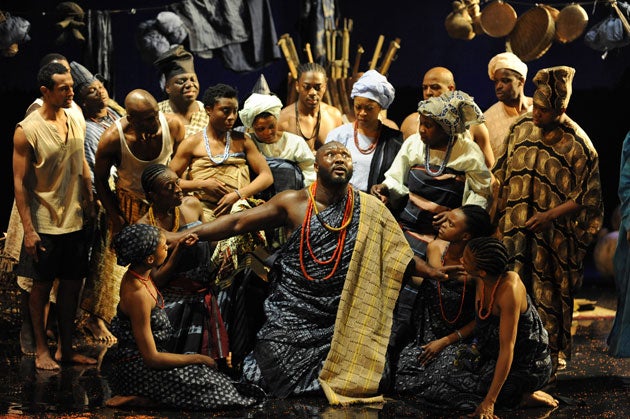Out of Africa: Award-winning African plays find a new home in British theatres

Your support helps us to tell the story
My recent work focusing on Latino voters in Arizona has shown me how crucial independent journalism is in giving voice to underrepresented communities.
Your support is what allows us to tell these stories, bringing attention to the issues that are often overlooked. Without your contributions, these voices might not be heard.
Every dollar you give helps us continue to shine a light on these critical issues in the run up to the election and beyond

Eric Garcia
Washington Bureau Chief
There is, once again, something new out of Africa. A slew of award-winning and critically acclaimed plays with their roots in that continent is shaking up Britain's theatre stages with vibrant tales of death, rebellion and escaped moose.
Death and the King's Horseman, an examination of tensions in colonial Nigeria by the Nobel Prize-winning playwright Wole Soyinka, recently completed a highly acclaimed run at the National Theatre. Meanwhile, the African reinterpretation of the Bible stories, The Mysteries – Yiimimangaliso, by the South African theatre company Isango Portobello, is returning to the Garrick Theatre in September after winning plaudits in 2002.
The Tricycle Theatre has just embarked on a South African season with Karoo Moose, the award-winning story of a girl's struggle for survival in a remote village, helped by an encounter with an escaped moose. It is be followed after next week by Koos Sas: Last Bushman of Montagu, a musical work about a rebellious hero.
The Observer, also at the National, tells the story of an election observer expected to rubber-stamp the victory of a corrupt president in a fictional West African country, a tale that has strong parallels with Zimbabwe. Lost in the Stars, the musical adaptation of Alan Paton's novel Cry, the Beloved Country, about racial tensions in apartheid South Africa, is on at the Queen Elizabeth Hall, while the Soho Theatre has just finished hosting the Nigerian play Iya-lle (The First Wife), about a chief's preparations for his wife's 40th birthday.
Even the National's hit War Horse has an African influence, with the puppeteers who bring life to the horses coming from South Africa.
Nick Kent, the artistic director of the Tricycle Theatre, said the popularity of African theatre was partly due to its vibrancy, and also because it is music- and narrative-driven, while tackling tough issues.
"African theatre is very eclectic and very narrative driven, which I think appeals to audiences. Here it's very much more reflective and intellectual," he said. "Since the apartheid era, African theatre has been more engaged socially. Even Karoo Moose, which tells the story of a small village and uses a lot of music, is very much about how women are treated. But there's also a narrative story that's very effective. South Africa has managed to capture music and story telling. Koos Sas is in Afrikaans, with subtitles, but has a tremendous vitality."
Dr Yvette Hutchison, who lectures in African theatre at the University of Warwick, agreed, adding that many productions combine spirituality, music and dance – art forms that have been split into separate traditions in Europe.
"African theatre addresses issues of identity and conflict," she said. "Because of its history, there is much to explore. Death and the King's Horseman isn't just about colonial interference, but also about how Africa has to move forward as well.
"European theatre became very intellectual and rational after the Enlightenment. African theatre remains spiritual and metaphysical. There is also less formality – the audience expects to contribute."
The British-born South African director of The Mysteries, Mark Dornford-May, added that this last element came as a relief after the "politeness" found in European theatre.
"The Mysteries are Bible stories played through an African prism," he said. "It's an ensemble theatre, and there are 33 actors on stage, which we don't see in European theatre. There is music, but it's not a musical.
"I do think people have become tired of formulaic music in theatre. African culture will incorporate, for example, Mozart and a work song, and perceive them as equally valid, or perhaps favour the work song. There's also a lot of physicality. The audience expects to be engaged. In Europe you sit in your seat and don't have contact with anyone and you may as well be watching a DVD. There's a sense of excitement in African theatre and exuberance of performance."
Subscribe to Independent Premium to bookmark this article
Want to bookmark your favourite articles and stories to read or reference later? Start your Independent Premium subscription today.
Join our commenting forum
Join thought-provoking conversations, follow other Independent readers and see their replies
Comments